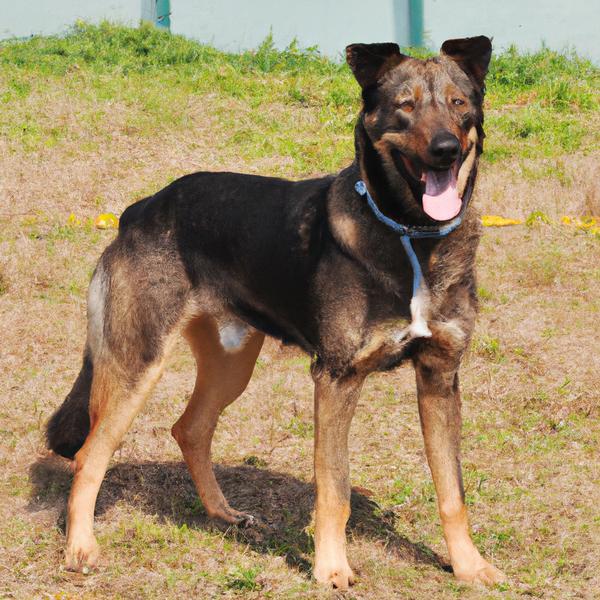English Lhasa Bull vs. Rat-A-Pap: Breed Differences and Similarities
Hypoallergenic
Are English Lhasa Bulls or Rat-A-Paps hypoallergenic, or neither?
Unfortunately, neither English Lhasa Bull nor Rat-A-Pap are hypoallergenic, which may not make them the best choice for dog lovers who suffer from pet allergies.
Temperament
What are the personalities of English Lhasa Bull and Rat-A-Pap dogs?
Playful
Loving
Alert
Courageous
Intelligent
Friendly
Obedient
Devoted
Lively
Social
Sweet
Aggressive
Steady
Spirited
Assertive
Loving
Happy
Energetic
Alert
Intelligent
Friendly
Affectionate
Lively
Inquisitive
Shedding Level
Do English Lhasa Bulls shed more than Rat-A-Paps, or which breed sheds more, English Lhasa Bulls or Rat-A-Paps?
English Lhasa Bulls are heavy shedders, but regular brushing can help manage shedding and promote a healthy coat.
Rat-A-Paps are moderate shedders, but regular brushing can reduce shedding and maintain coat health.
Ancestry
What are the origins of English Lhasa Bull and Rat-A-Pap breeds?
English Bulldog and Lhasa Apso
Papillon, American Rat Terrier
Date of Birth
When were English Lhasa Bull and Rat-A-Pap breeds first developed?
Unknown
Eye Color Possibilites
What are the eye colors of English Lhasa Bull and Rat-A-Pap dogs?
Brown
Brown
Nose Color Possibilites
What are the natural nose colors of English Lhasa Bull and Rat-A-Pap?
Black
Black
Coat Color Possibilites
What are the natural colors of the coat for English Lhasa Bull and Rat-A-Pap breeds?
Black
Blue
Cream
Fawn
Brindle
White
Red
Silver
White
Black
Brown
Red
Fawn
Coat Length
What is the typical coat length for English Lhasa Bull and Rat-A-Pap breeds?
English Lhasa Bulls have longer coats compared to most dogs.
Rat-A-Paps have medium-length coats.
Coat Density
What is the density of the coat of English Lhasa Bull and Rat-A-Pap?
Coat Texture
What is the hair texture of English Lhasa Bull and Rat-A-Pap?
Straight
Litter Size
What is the usual litter size for English Lhasa Bull and Rat-A-Pap?
An English Lhasa Bull can have a litter of 4-6 puppies on average. However, it's worth noting that the size of the litters can vary greatly. Factors that can influence litter size include the health of the mother, breeding history, and genetics.
A Rat-A-Pap can have a litter of 5-7 puppies on average. However, it's worth noting that the size of the litters can vary greatly. Factors that can influence litter size include the health of the mother, breeding history, and genetics.
Adaptability
English Lhasa Bull and Rat-A-Paps are known for their adaptability and versatility. They are capable of adapting well to a wide range of lifestyle changes and living environments, making them great companions for families and individuals of all lifestyles.
Health Issues
Between English Lhasa Bull and Rat-A-Pap, which breed is more prone to health problems?
English Lhasa Bulls typically have low vet costs due to their good health, but it's important to monitor their health and seek vet care when necessary.
While the Rat-A-Pap breed is generally healthy, occasional vet check-ups are still necessary to address any health concerns.
Major Concerns
What are the major health concerns for English Lhasa Bull and Rat-A-Pap breeds?
Patellar Luxation
Hydrocephalus
Brachycephalic Syndrome
Hip Dysplasia
Minor Concerns
What minor health issues should be kept in mind when owning English Lhasa Bull and Rat-A-Pap?
Hip Dysplasia
Eye disorders and disease
Skin trouble
Patellar Luxation
Cataracts
Glaucoma
Von Willebrand's Disease
Hypothyroidism
Dental Problems
Occasional Tests
What occasional tests are recommended for English Lhasa Bull and Rat-A-Pap breeds?
Eye Examination
X-ray imaging
CT or MRI scan
Cutaneous cytology
Radiographs
Blood Analysis
Blood Sugar and Thyroid Tests
Complete Physical Examination
Social Needs
English Lhasa Bull vs Rat-A-Pap social needs comparison
English Lhasa Bull has above average social needs and thrives with interaction with humans and other dogs.
Rat-A-Pap has very high social needs and requires regular mental and physical stimulation, a job or purpose, and companionship.
Sleeping Need
Which of the two sleeps the most/least: English Lhasa Bull or Rat-A-Pap?
English Lhasa Bulls have moderate energy levels and typical sleep patterns of 12-14 hours per day.
Rat-A-Paps sleep less than other breeds but still need adequate sleep for good health.
Mouthiness
Mouthiness Comparison: English Lhasa Bull vs Rat-A-Pap?
Roaming urge
English Lhasa Bull vs Labrador: Running away tendency?
Prey Drive
English Lhasa Bull or Rat-A-Pap - which breed has a higher level of prey drive?
Activity Level
Which breed has higher energy, English Lhasa Bulls or Rat-A-Paps?
English Lhasa Bulls are low-energy dogs. This breed make a great companion for a relatively inactive person. English Lhasa Bull dogs require a few short daily walks, and then they're happy snuggling next to you for the rest of the day.
Rat-A-Paps are high-energy dogs. They need mental as well as physical exercise. These dogs require a lot of your involvement and without it they can, and will, become problematic dogs.
Tolerance of being left alone
Walks per Week
How many miles should English Lhasa Bull or Rat-A-Pap walk each week?
There's really no limit to how far you walk your dog as long as they're comfortable. For English Lhasa Bull, it's at least 5 miles / week. Just remember to build distance and stamina gradually over time.
There's really no limit to how far you walk your dog as long as they're comfortable. For Rat-A-Pap, it's at least 10 miles / week. Just remember to build distance and stamina gradually over time.
Activity per Day
Do English Lhasa Bulls or Rat-A-Paps require more exercise?
In general most English Lhasa Bulls usually need at least 20 minutes of exercise daily. This can be spread across the day and include all sorts of high-energy activities, like walking, running and playing.
In general most Rat-A-Paps usually need at least 60 minutes of exercise daily. This can be spread across the day and include all sorts of high-energy activities, like walking, running and playing.
Grooming
Which breed is easier to maintain in terms of grooming, English Lhasa Bulls or Rat-A-Paps?
English Lhasa Bulls require significant grooming, including regular trims and professional grooming assistance to maintain their coat. They may also require frequent bathing to keep their coat and skin healthy.
The Rat-A-Pap has low grooming needs and is easy to maintain.
Brushing Frequency
What is the recommended brushing frequency for English Lhasa Bull and Rat-A-Pap dogs?
Ideally, English Lhasa Bull should be brushed at least 2 or 3 times a week (preferably daily) improve shedding.
Rat-A-Pap should be brushed at least once a week. Of course you can give them more frequent brushes if you find that they are still shedding a lot
Brushing Tools
What brushing tools are used for English Lhasa Bulls and Rat-A-Paps?
Slicker Brush
Clipper
Nail Clipper
Pin Brush
Slicker Brush
Nail Clipper
Cups
How much food should be given to English Lhasa Bull or Rat-A-Pap in cups?
For an average 25-40 pound (11 - 18 kg) English Lhasa Bull feed 1.5 cups daily. But, keep in mind, the amount you feed is going to be dependent on the quality of the food you are feeding.
For an average 10-15 pound (5 - 7 kg) Rat-A-Pap feed 1 cups daily. But, keep in mind, the amount you feed is going to be dependent on the quality of the food you are feeding.
Daily Cost
Which breed has a higher daily cost, English Lhasa Bull or Rat-A-Pap?
English Lhasa Bull and Rat-A-Pap have a similar average daily cost of around $1.40 - $1.70.
Monthly Cost
Which breed has a higher monthly cost, English Lhasa Bull or Rat-A-Pap?
When it comes to monthly expenses, both English Lhasa Bull and Rat-A-Pap have a similar average cost, ranging from $35 - $42. This results in an average yearly cost of around $420 - $504.
Sensitivity Level
How do English Lhasa Bull and Rat-A-Pap compare in sensitivity?
This breed is sensitive to its environment and best suited for patient and understanding families with a consistent routine.
This breed is sensitive and requires gentle handling and a calm home environment.
Apartment Friendly
Which breed is more apartment-friendly: English Lhasa Bull or Rat-A-Pap?
English Lhasa Bulls make excellent apartment dogs, being fairly active indoors and not requiring a yard.
The Rat-A-Pap is a great apartment dog, thriving with sufficient exercise and time outside as part of their daily routine.
Child Friendly
Do English Lhasa Bulls or Rat-A-Paps have a friendlier temperament towards children?
The typical characteristics of English Lhasa Bull and Rat-A-Pap indicate that this breed of dog is an ideal companion for kids and makes them family pets. Their gentle and protective nature and calm mentality make them gel along quickly with the younger humans.
Senior-friendly
Which dog is more suitable as a pet for the elderly - English Lhasa Bull or Rat-A-Pap?
Cat Friendly
Do English Lhasa Bull or Rat-A-Pap breeds have a better compatibility with cats?
English Lhasa Bulls and Rat-A-Paps are very cat friendly dogs. They generally make good companions for cats.
Dog Friendly
Which breed is more sociable with other dogs: English Lhasa Bull or Rat-A-Pap?
English Lhasa Bulls are generally very friendly towards other dogs, with a happy and affectionate temperament.
Rat-A-Paps are average in their friendliness towards other dogs, and socialization can help.
Pet friendly
How do English Lhasa Bull or Rat-A-Pap dogs interact with other pets?
Stranger Friendly
Which breed is more friendly with strangers: English Lhasa Bull or Rat-A-Pap?
English Lhasa Bulls are friendly but may bark at strangers, and training is easy due to their intelligence.
Rat-A-Paps are highly friendly around strangers.
Playfulness
Which breed is more playful between English Lhasa Bull and Rat-A-Pap?
English Lhasa Bulls are not known for being a highly playful breed.
Rat-A-Paps are a playful breed that needs daily playtime to be happy.
Trainability
How do the trainability levels of English Lhasa Bulls and Rat-A-Paps compare?
English Lhasa Bulls are usually easy to train but require consistency to fully obey commands.
Rat-A-Paps are popular for their ease of training and quick learning ability.
Compare English Lhasa Bull with other breeds

Blue Spaniel
English Lhasa Bull vs Blue Spaniel

English Bully Staffy Bull Terrier
English Lhasa Bull vs English Bully Staffy Bull Terrier

Cattle Shepherd
English Lhasa Bull vs Cattle Shepherd

Australian Cattle Dog
English Lhasa Bull vs Australian Cattle Dog

Chi-Spaniel
English Lhasa Bull vs Chi-Spaniel

Japeke
English Lhasa Bull vs Japeke

Chi-Chi
English Lhasa Bull vs Chi-Chi

Crustie
English Lhasa Bull vs Crustie

Mini English Cocker
English Lhasa Bull vs Mini English Cocker

Boxmas
English Lhasa Bull vs Boxmas

Rhodesian Bernard
English Lhasa Bull vs Rhodesian Bernard

Westie-Laso
English Lhasa Bull vs Westie-Laso

